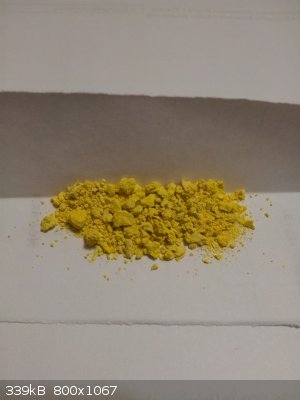| Pages:
1
2
3 |
quicksilver
International Hazard
    
Posts: 1820
Registered: 7-9-2005
Location: Inches from the keyboard....
Member Is Offline
Mood: ~-=SWINGS=-~
|
|
My experience with picrates was interesting even though they are somewhat weak, they can be altered. That's about as dark as I have seen. Did it
reflect light via crystalline planes?
I have experimented with microscope-digital cameras and been disappointed twice. I may spend some money to get a decent one because Microscopy has
been a 'side-hobby" almost all my life and I still have some decent ones and (IMO) some pretty fine sample slides.
|
|
|
freedompyro
holmes1880
Posts: 116
Registered: 16-6-2011
Member Is Offline
Mood: No Mood
|
|
Not in the least bit reflective in any way I assure you. Not one glint!
|
|
|
quicksilver
International Hazard
    
Posts: 1820
Registered: 7-9-2005
Location: Inches from the keyboard....
Member Is Offline
Mood: ~-=SWINGS=-~
|
|
Well, the only sample I worked with that had any significant energy to it was a basic lead picrate that set up as relativity tough "dark orange"
polygons & the variable that MAY have made a difference was the duration of temp (in some thread I have a picture but no magnification: good color
however. Most often the synthesis above is followed with a full hour at temperature but it MAY have been cutting that shorter and allowing the
solution to come to room temp through an hour made a slight difference (cutting the heat at 40-50min). And realistically, it was not very energetic. I
doubt that 0.5 could function as a burst for a little shell. Interestingly I have seen Pb Picrate used as a "bulking agent" in some primer
compositions but could find no method to determine if it had a flame spit upon det. like Pb styphnate does.
I had considered other heavy metals such as mercury but could find no literature.
[Edited on 13-2-2012 by quicksilver]
|
|
|
otonel
Hazard to Self
 
Posts: 84
Registered: 9-4-2005
Member Is Offline
Mood: No Mood
|
|
I have a question: if I have tetryl (C7H5N5O8) and lead oxide can make lead picrate using that chemicals?
|
|
|
Hennig Brand
International Hazard
    
Posts: 1284
Registered: 7-6-2009
Member Is Offline
Mood: No Mood
|
|
I think there are much better uses for tetryl even if it could work.
I noticed that the old military improvised lead picrate synthesis calls for nearly equal molar amounts of picric acid and lead oxide. If the reaction
is taken to completion there would be one mole of lead for each mole of picric acid reacted. Basic lead picrate requires one mole of lead per mole of
picric acid. Normal lead picrate requires one molecule of lead for two molecules of picric acid (from what I understand). If the product isn't basic
lead picrate then what is it? Lead picrate can form several basic salts, according to Matyas.
I did the following only because I have never tried making lead picrate using lead oxide. Lead monoxide has poor solubility in water and methanol and
its reaction with picric acid is slow. I tried the reaction with picric acid and lead monoxide, first in water, which even with a two hour long
reaction time at boiling water temperature resulted in a partial reaction. The volume of water was kept to a minimum, a little makeup water was added
from time to time during the reaction and magnetic stirring was used. I dried the solids and then added methanol and tried again. The mixture was
boiled under partial reflux with magnetic stirring. A small amount of methanol escaped as vapor during the reaction. After 1.5 hours the methanol had
boiled down nearly completely at which point the beaker was taken off heat and the reaction products allowed to dry almost completely. The reaction
this time appeared to be basically complete, but I am unconvinced of this. The more soluble lead salts are much easier to react with picric acid.
The last 10 or 15 minutes of the reaction a darker orange color was starting to develop, but on drying the lead picrate still looks very yellow.

[Edited on 25-10-2014 by Hennig Brand]
"A risk-free world is a very dull world, one from which we are apt to learn little of consequence." -Geerat Vermeij
|
|
|
Mush
National Hazard
   
Posts: 634
Registered: 27-12-2008
Member Is Offline
Mood: No Mood
|
|
Complex salts of basic lead picrate
US 3293091 A
Basic lead double salts of picric acid and method of preparing such salts
US 3262956 A
Complex crystalline picrate explosive containing entrapped amounts of lead azide
US 3431156 A
Attachment: US3262956.pdf (1.2MB)
This file has been downloaded 709 times
Attachment: US3293091.pdf (2.3MB)
This file has been downloaded 673 times
Attachment: US3431156.pdf (1.1MB)
This file has been downloaded 721 times
|
|
|
| Pages:
1
2
3 |